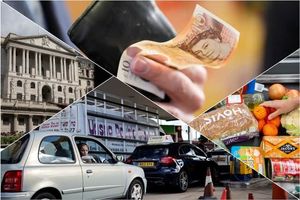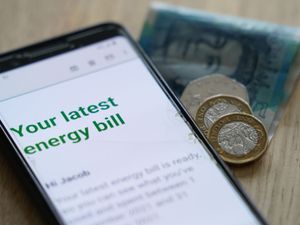UK inflation rate: what it means for interest and mortgage rates, Bank of England 2024 target explained - news
Inflation has dropped to 1.7%, falling below the Bank of England’s target for the first time since April 2021.
Watch more of our videos on ShotsTV.com
and on Freeview 262 or Freely 565
UK inflation dropped to 1.7% in September, under the Bank of England's 2% target, for the first time since April 2021
The decline was mainly driven by a 10.4% decrease in petrol prices and lower airfares due to post-summer sales
Despite the overall drop, food and drink inflation increased, with notable price rises in milk, cheese, eggs, and fruit
Benefits are set to rise by 1.7% next year, while pensions could increase by 4.1%, owing to the "triple lock" policy
Lower inflation may lead to a pause or reduction in interest rates, potentially easing mortgage payments
New data has shown that inflation fell below the Bank of England’s target rate last month for the first time since April 2021.
According to the Office for National Statistics (ONS), the Consumer Prices Index (CPI) inflation rate dropped to 1.7% in September, down from 2.2% in August.
This decline was largely influenced by a significant drop in petrol prices and decreased airfares. Inflation came in lower than anticipated, with analysts having forecasted a rate of 1.9% for the month. Darren Jones, Chief Secretary to the Treasury, said: “It will be welcome news for millions of families that inflation is below 2%. However, there is still more to do to protect working people...”
So what does it mean for the average consumer? Will prices rise or fall, and ultimately, could we end up with more money in our wallets? Here is everything you need to know about it....

Why has inflation fallen?
Inflation has fallen primarily due to a significant drop in transportation-related costs - for example, motor fuel and lubricant prices dropped sharply by 10.4% compared to September last year.
This decline in petrol prices directly impacts transportation costs, making it cheaper for consumers to drive and for businesses to transport goods, which in turn can stabilise or lower other prices in the economy.
Air travel costs also declined, with fares falling by around 5% in September due to post-summer sales - lower airfares affect not only travel costs for consumers but also reduce some logistics costs for airfreighted goods.
But despite the overall drop, food and non-alcoholic drink inflation saw a reversal from its previous slowdown, with prices increasing to 1.9% in September from 1.3% in August.
Items like milk, cheese, eggs, and fruit were subject to stronger price increases, reflecting ongoing pressures from supply chain disruptions and global food prices.
What does the fall in inflation mean for me?
Inflation dropping doesn’t necessarily mean prices will fall. Instead, it indicates that prices are rising more slowly than before.
Some items that have fallen in price, like petrol and airfare, could offer relief to household budgets, but grocery and utility costs might still increase, albeit at a less steep rate than in recent months.
For certain goods, though, the reduced inflationary pressure could slow or stabilise price hikes.
If inflation stays lower, wage gains could catch up to or outpace inflation, which would give consumers more purchasing power.
Additionally, if mortgage payments stabilise and essential goods become more affordable, households may find themselves with more disposable income.
While lower inflation alone doesn’t guarantee immediate extra cash for everyone, it does point to a more favourable environment for household budgets if the trend continues and wage growth holds steady.
What does it mean for benefits and pensions?
The inflation figure has direct implications for state benefits and pensions, as the government uses the September inflation rate to adjust many benefit payments and tax thresholds for the upcoming year.
With the inflation rate recorded at 1.7% in September, many benefits are set to rise by this percentage next year.
This 1.7% increase will provide some additional support but may feel limited as energy prices increase, and could be eroded by rising household costs.
The Joseph Rowntree Foundation, which works on tackling poverty, said a 1.7% increase would mean the standard allowance basic rate of universal credit (UC) would rise by around £1.50 a week from its current level of £90.55, while the basic rate for couples would go up by around £2.50 a week from the current level of £145.13 a week.
The Resolution Foundation economic think tank, which focuses on living standards, said the changes will mean a typical low-income family with two children would see its annual UC award rise by £253 next April.
The Joseph Rowntree Foundation’s Iain Porter said: “The consequence of today’s rate of inflation is that April’s uprating will be worth just a few pounds to most people.
“The reality is millions of families can’t afford enough food this week, or to turn the heating on as the nights get colder – emphasised by the fact that food price inflation has risen for the first time since early last year.
“The basic rate of universal credit is so insufficient it fails to protect families from hardship, and this increase will barely touch the sides.”
The UK state pension is governed by the “triple lock” policy, which guarantees that pensions will rise annually by the highest of three figures: 2.5%, average wage growth, or the September inflation rate.
Given that wage growth has recently been higher than inflation, pensions are expected to increase by 4.1% in April 2024, providing a more substantial boost to pensioners' income.
The increase will help compensate for the Government’s decision to strip winter fuel payments from all but the poorest households. A 4.1% rise would mean an increase of around £473 for the new state pension and £361 for the basic pension.
The 1.7% inflation rate will also likely influence adjustments in various tax thresholds, allowances and spending programmes, as the government often aligns these with inflation to maintain taxpayers’ purchasing power and ease the impact of inflation on public finances.
What does it mean for mortgage rates?
The heavier-than-predicted fall in the inflation rate is expected to add pressure onto Bank of England rate-setters to cut interest rates, which had been hiked in recent years to bring inflation down to the 2% target.
Policymakers at the central bank’s Monetary Policy Committee (MPC) will decide whether to reduce interest rates – which help set mortgage and borrowing rates – from their current 5% level at a meeting next month.
Economists have suggested that weaker pay growth and easing price inflation mean Bank of England officials are very likely to cut rates next month.
For consumers with variable-rate mortgages, a pause or reduction in rate hikes would mean smaller monthly payments.
Those with fixed-rate mortgages won’t see an immediate impact, but could benefit from potentially lower rates if they refinance in the future.
What do you think about the recent drop in inflation - will it make a difference for your budget, or do rising food and household costs still weigh heavily on your mind? Share your thoughts in the comments section.





